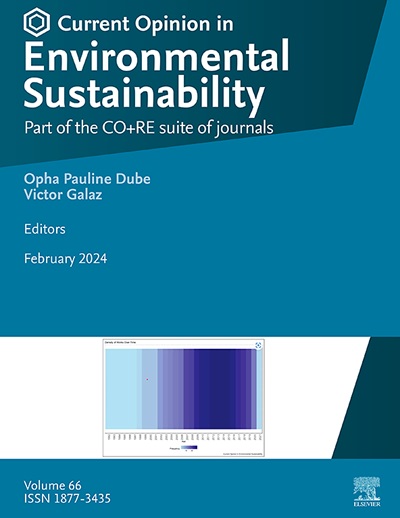The paradox of climate resilience and elusive peace in the Lake Chad Basin: a case for an adaptive governance approach
IF 6.3
2区 环境科学与生态学
Q1 ENVIRONMENTAL SCIENCES
Current Opinion in Environmental Sustainability
Pub Date : 2025-03-18
DOI:10.1016/j.cosust.2025.101523
引用次数: 0
Abstract
For several decades, the Lake Chad Basin has served as a laboratory for scientific inquiries on anthropogenic security challenges in Africa. Between 1963 and the early 1990s, more than 90% of Lake Chad vanished, largely due to environmental stressors and overuse — for farming, fishing, livestock herding, and power generation. The receding Lake has been associated with a complex array of human security concerns, including food insecurity, loss of lives, biodiversity and livelihoods, poverty, droughts, enforced migration, violent conflicts, and terrorism. Since the 1990s, however, thanks in part to local climate resilience, the volume of the Lake has remained fairly stable despite rising temperatures and demography. Yet, trends reveal that armed conflicts and insecurity in the region continue to resurge periodically over the last two decades, derailing prospects for durable peace. The potential gains of adaptation are undermined by severe governance deficits. Drawing from relevant secondary sources, expert opinion interviews, a focus group discussion, and key informant interviews, this paper interrogates this paradox, highlighting the merits and limits of climate resilience for forging durable peace in the Lake Chad Basin. It builds the case for participatory adaptive governance as a more inclusive approach to sustainable conflict transformation in the Anthropocene.
乍得湖流域气候适应能力与难以捉摸的和平之间的矛盾:适应性治理方法的案例
几十年来,乍得湖盆地一直是非洲人为安全挑战科学研究的实验室。从1963年到90年代初,超过90%的乍得湖消失了,主要是由于环境压力和农业、渔业、畜牧业和发电的过度使用。退湖与一系列复杂的人类安全问题有关,包括粮食不安全、生命损失、生物多样性和生计、贫困、干旱、被迫迁移、暴力冲突和恐怖主义。然而,自20世纪90年代以来,部分由于当地的气候适应能力,尽管气温和人口不断上升,湖泊的体积仍然保持相当稳定。然而,趋势表明,在过去二十年中,该区域的武装冲突和不安全继续周期性地死灰复燃,破坏了持久和平的前景。严重的治理赤字削弱了适应气候变化的潜在收益。本文从相关的二手资料、专家意见访谈、焦点小组讨论和关键线人访谈中,对这一悖论进行了质疑,强调了气候适应能力对于在乍得湖盆地建立持久和平的优点和局限性。它建立了参与性适应性治理的案例,将其作为人类世可持续冲突转型的更具包容性的方法。
本文章由计算机程序翻译,如有差异,请以英文原文为准。
求助全文
约1分钟内获得全文
求助全文
来源期刊

Current Opinion in Environmental Sustainability
ENVIRONMENTAL SCIENCES-ENVIRONMENTAL SCIENCES
CiteScore
13.80
自引率
2.80%
发文量
52
审稿时长
6-12 weeks
期刊介绍:
"Current Opinion in Environmental Sustainability (COSUST)" is a distinguished journal within Elsevier's esteemed scientific publishing portfolio, known for its dedication to high-quality, reproducible research. Launched in 2010, COSUST is a part of the Current Opinion and Research (CO+RE) suite, which is recognized for its editorial excellence and global impact. The journal specializes in peer-reviewed, concise, and timely short reviews that provide a synthesis of recent literature, emerging topics, innovations, and perspectives in the field of environmental sustainability.
 求助内容:
求助内容: 应助结果提醒方式:
应助结果提醒方式:


